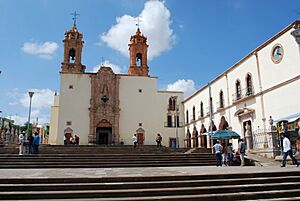Plateros, Zacatecas facts for kids
Plateros is a small town in Mexico, located in the state of Zacatecas. It's famous for its history of mining and for being home to a very important religious site. This site is called the Sanctuary of Santo Niño de Atocha, which attracts many visitors every year.
The town was first started in 1566 and was named San Demetrio. Later, around 1621, its name was changed to Plateros.
Contents
History of Plateros
The area where Plateros is now located was first settled in 1566. This happened when some miners got lost while looking for the mining town of Fresnillo nearby.
As they explored the area, the miners discovered silver. This happened on Saint Dimitri's Day, so they named the place San Demetrio. After the year 1621, the town became known as Plateros. This Spanish word means "silver miners."
The First Churches and Statues
The first church built in Plateros had a special crucifix called "El Señor de Plateros." People believed this crucifix had powers to heal.
A second church was built in 1789. A rich local miner gave a gift to this new church. He brought a statue from Spain of Nuestra Señora de Atocha, also known as Maria de Atocha. This statue showed Maria holding a small figure of baby Jesus. This baby Jesus figure could be removed and was used as a special attraction every Christmas Eve.
The Rise of Santo Niño de Atocha
Over time, people became more interested in the baby Jesus figure than in Maria de Atocha. This baby Jesus figure became known as Santo Niño de Atocha.
In the 1800s, interest in Santo Niño de Atocha grew across the mining areas of Zacatecas. Later in the 1800s, the town brought in a new version of the boy. This one was dressed in blue and was called "Niño Azul" (Blue Boy). This image showed a boy about ten years old performing two miracles. This new "Niño Azul" became very popular in pictures.
By the early 1900s, priests at the Plateros Sanctuary used this image to help some Huichols convert to Christianity.
Visiting Plateros
Today, religious tourism is a very important business in Plateros. The Sanctuary of Santo Niño de Atocha is the third most visited religious place in all of Mexico.
About 1.5 million people visit Plateros every year. Only the Basilica of Guadalupe in Mexico City and San Juan de los Lagos in the state of Jalisco attract more visitors. The Huichol people, who live in the mountains, also visit Plateros to sell their handmade goods.
See also
 In Spanish: Plateros (Zacatecas) para niños
In Spanish: Plateros (Zacatecas) para niños
 | Roy Wilkins |
 | John Lewis |
 | Linda Carol Brown |


